It’s possibly the question that I receive most: should I use salted or unsalted butter? Or: is it OK if I substitute salted butter for unsalted butter?
Today I want to talk about the differences in salted and unsalted butter, substitutions you can make if you only have one kind on hand (and it’s not the kind your recipe calls for), and why some recipes call for one type of butter over the other.
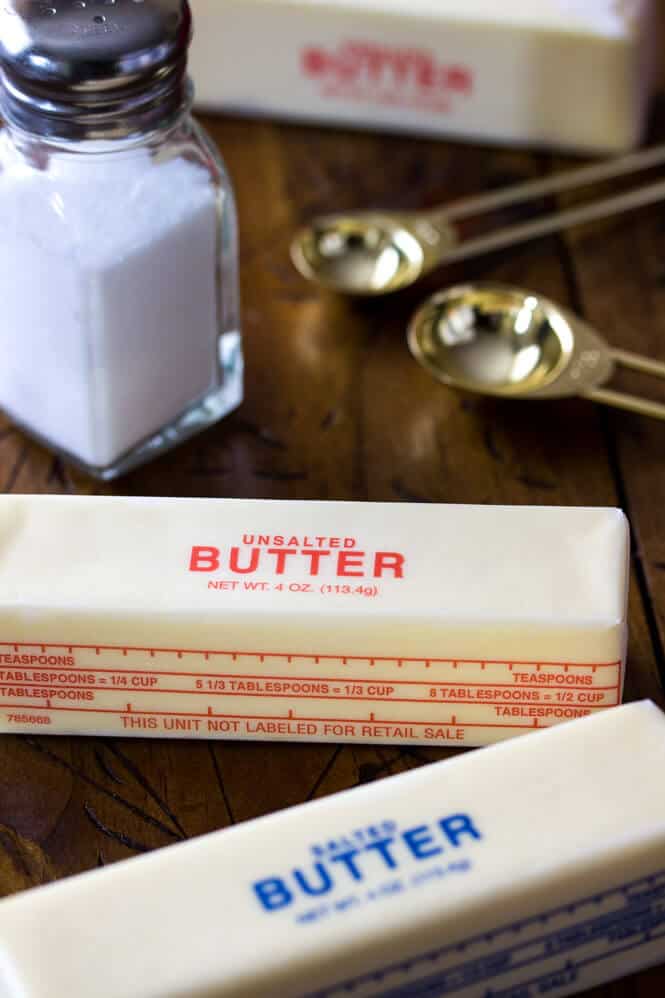
Until about two years ago, my inclination when baking was to always reach for the salted butter, no matter what the recipe said.
More salt = more flavor, right?
Well, no, not necessarily.
In fact, in nearly all of my recipes that I share here, I specifically call for unsalted butter.
So why is that? Well, there are several reasons, so, if you don’t mind reading over 500 words about my favorite fat, let’s discuss.
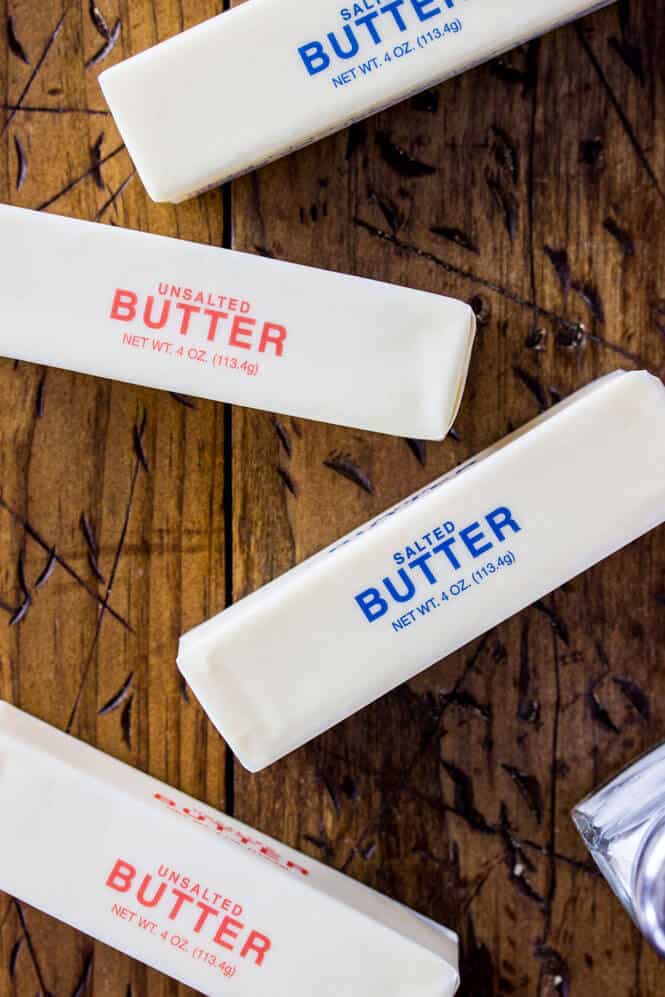
Salted vs. Unsalted Butter: What’s the Difference in Baking?
If you’re buttering toast or nestling a big hunk of butter on top of some steaming hot pancakes, you’re going to want to go with the salted butter, that will give you the best flavor in these situations.
However, when you’re baking, it’s a whole different story because we want to be able to control the amount of salt that we’re adding to our cupcakes, cookies, cakes, etc.
And that’s what it all boils down to: The reason that most baking recipes call for unsalted butter is because of the need for control.
When you use salted butter, it is very difficult (impossible?) to know for sure how much salt is being added to the recipe by way of the stick of butter.
Different brands use different amounts of salt in their butter, so unfortunately, you lose all of your control and run the risk of over-salting your recipe.
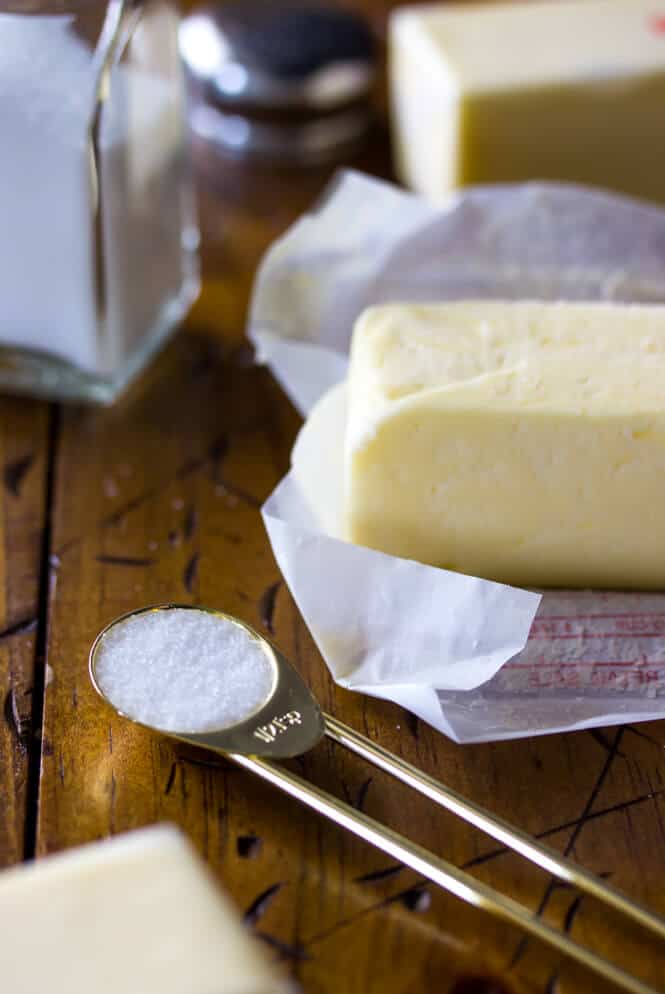
As a recipe developer, I put a ton of time into making the recipes that I share just right. I’ve optimized every ingredient with the goal of giving you the best flavor possible. Most other recipes that you’ll find across Pinterest and the web are fine-tuned the same exact way.
So, if a recipe calls for unsalted butter and a half teaspoon of salt, but you use salted butter and a half teaspoon of salt, you’re going to have a saltier dish than the recipe was actually designed for. Not more flavorful, but actually a worse result.
Carefully following what is called for in the recipe is the best way to ensure that you will get the best results possible
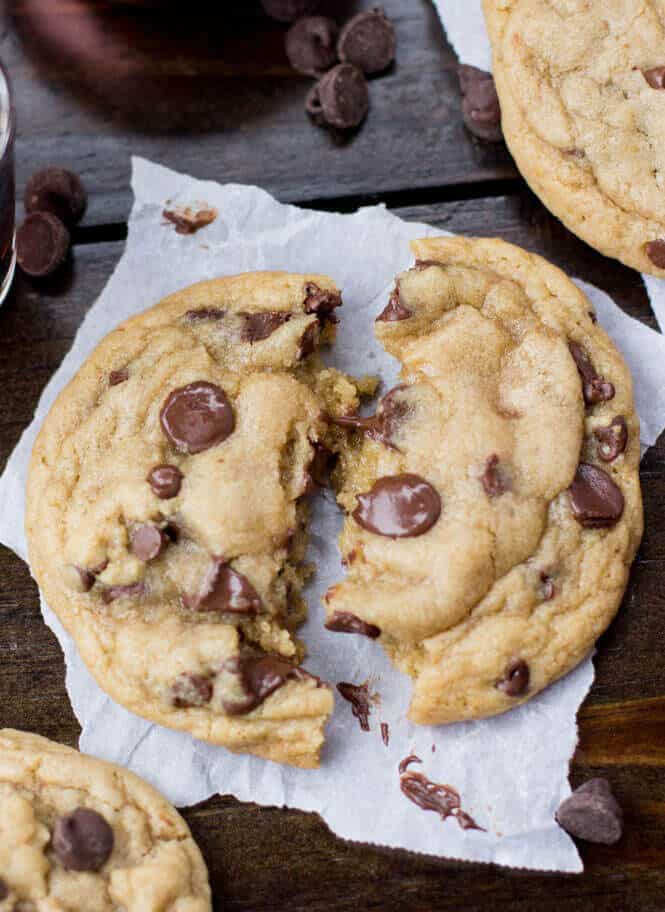
Freshness is a Factor
Unsalted butter is generally believed to also be fresher than salted butter.
The reason behind this is that since salt is a preservative, salted butter can be stored longer and may be older than your unsalted butter. In fact, it could actually be bad, or approaching going bad, but the quality would be masked by the salt.
For the best, freshest, flavor in baking, always use unsalted butter.
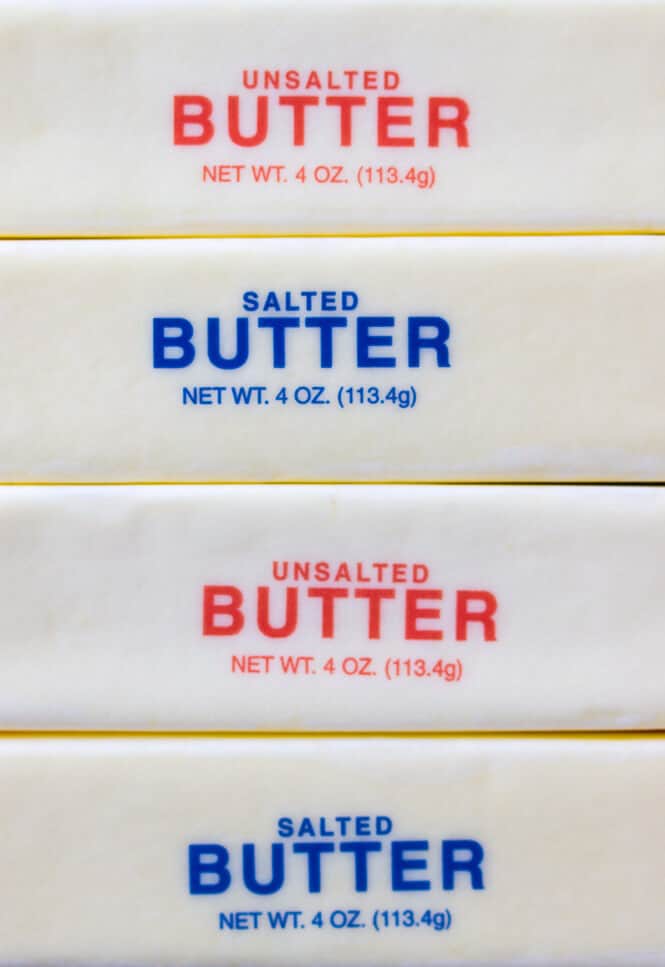
Unsalted Butter Substitute
But let’s say you’re set to bake some cookies, the recipe calls for unsalted butter, but you only have salted on hand. You’re already in your comfy pants after a long day at work and not about to run back out to the store, so what can you do?
While unsalted butter is always preferred when called for, there is a substitution: my general rule of thumb is to decrease the amount of salt that the recipe calls for by ½ teaspoon per cup of butter.
For example, if a recipe calls for 1 cup (or two sticks, or 227g for you metric users) of unsalted butter and 1 teaspoon salt, I would use 1 cup of salted butter and only ½ teaspoon of salt. If the recipe called for 1 cup of unsalted butter and ½ teaspoon salt, I would omit the salt entirely.
That’s ¼ teaspoon of salt per stick (113g) of butter.
Ideally, you want to use what the recipe calls for, but this subtle variation has never steered me wrong in the past.
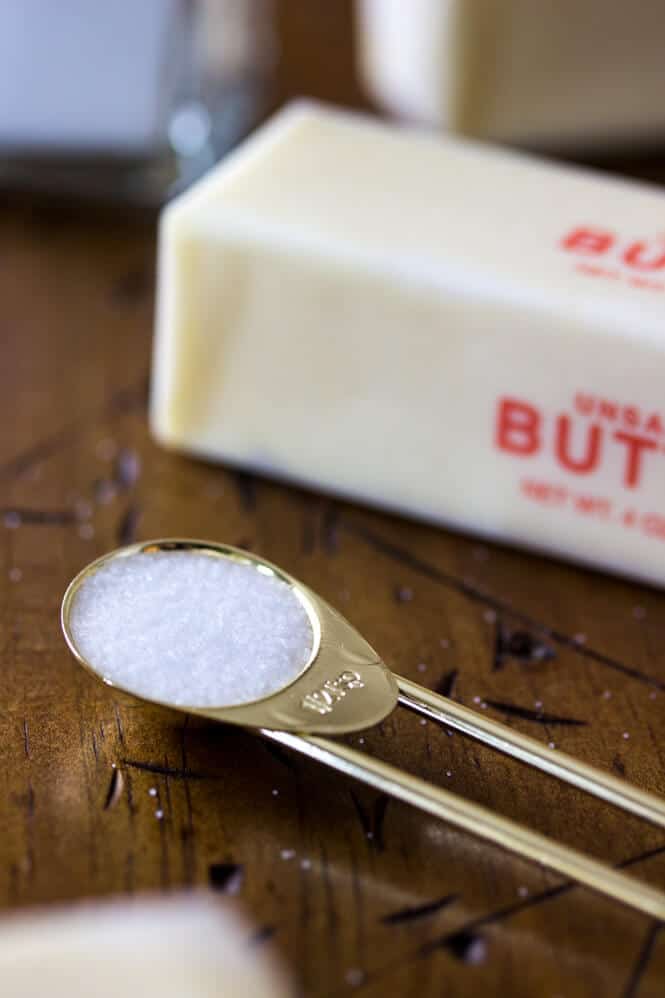
Salted Butter Substitute
It’s less common that you’ll find a recipe that calls for salted butter when you only have unsalted on hand, but if you do, just apply the above steps backwards.
That is: for every 1 cup of salted butter that the recipe calls for, use 1 cup unsalted butter and ½ teaspoon salt, instead.
Super simple stuff, huh?
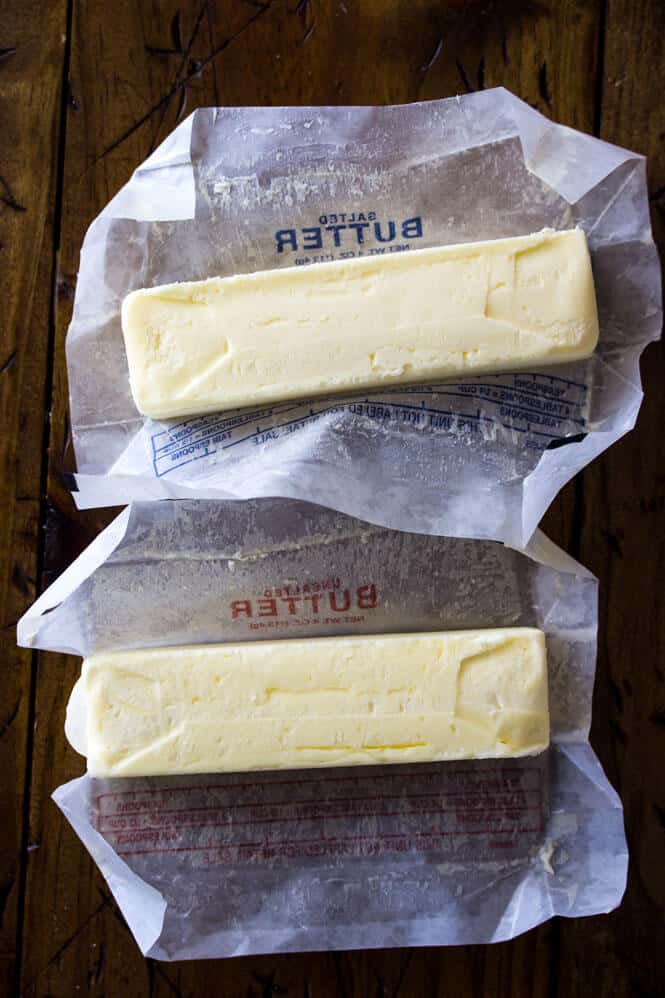
Ok so that’s it for today. In summary:
- Use the salt that the recipe calls for, when possible.
- Unsalted butter is most often used to give you more control over the salt content of the recipe and to maximize freshness and flavor without making your baked goods overly salty.
- If you only have salted butter and the recipe calls for unsalted, reduce the salt called for in the recipe by ½ teaspoon per cup of butter called for. This isn’t an exact science (remember, we aren’t sure how much salt is actually in salted butter), but it will produce best results.
Are there any other kitchen questions that you have that you’d like me to write about next? I have a few more planned but I’m happy to receive any suggestions!
Other Kitchen Tips:
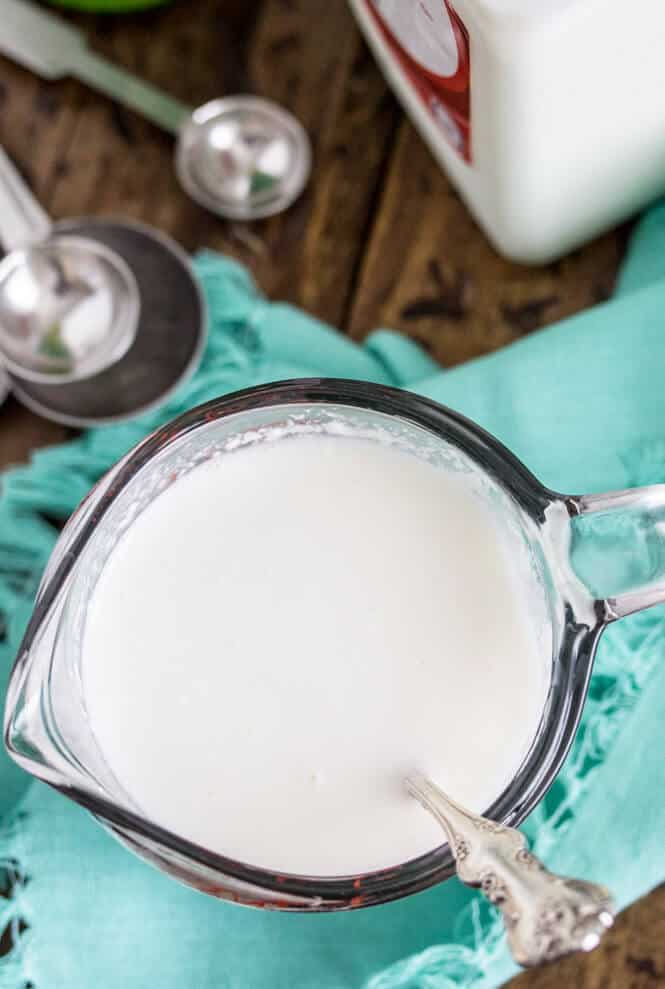

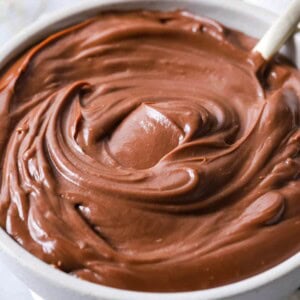
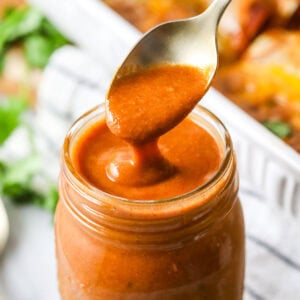
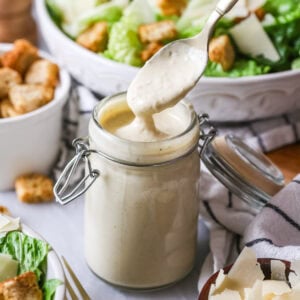
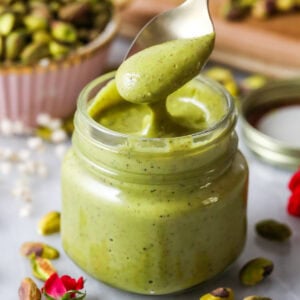
Tracy
Thanks for the tip on grating butter. I have never heard of that before. I was going to run out and buy a pastry cutter. I have retired recently and have begun doing more baking and homemade recipes. I tried to make biscuits this morning the way my grandmother did (with her recipe) and they did not rise very well. I think I overworked the butter. My grandmother did not have a pastry knife. She used her hands and squeezed the butter into the flour after cutting it in small pieces. I think I went too far with that and got the butter too warm. Grating it may be the better option for me and it precludes a Target run! Thanks!
Jody
I came across this exact post on fb and it seems suspicious. Is it you or someone pretending to be you? Your response says you’re sending DM to try it. I’m confused. Just thought I’d give u a heads up in case it’s not you and someone is using your fb name.
Sam
Hi Jody! I’ll keep an eye out for it. Thanks!
Danielle Kane
What kind of salt? Kosher – with large crystals like I use when baking shortbread, for that burst of tangy flavor? Or fine sea salt? How about sweet Maldon salt? I always wondered if that had a place in baking.
Sam
Hi Danielle! It’s typically table salt as the small crystals dissolve much more easily. 🙂
Harvest
I’ve always had a passion for sweets. Recently, I’ve begun experimenting with my own baking recipes and techniques, striving to perfect them to match my vision of ideal desserts. I’ve never included salt in any of my creations, even when it’s listed as an ingredient. I exclusively use unsalted butter because I want to maintain a purely sweet flavor without any salty notes. Now, with all this discussion about “flavor,” I’m feeling overwhelmed and worried that it might compromise the taste of my baked goods. What should I do?
Sam
The salt will likely make the flavor “pop” a bit more. I would recommend trying it and seeing how it goes. 🙂
Sheila
If you use salty butter, can you ommit adding salt to the recipe?
Emily @ Sugar Spun Run
Hi Sheila! Sometimes you can, sometimes you can’t; it really depends on how much the recipe calls for. We discuss this in detail within this post 🙂
Earl
Thank you for answering the question that I’ve had for decades about butter!
Nobody that I’ve asked could ever give me an answer. Now I know. Thanks!
Sam
You’re welcome! 🙂
cristy white
I cannot even thank you enough for the tip about the freshness of salted vs. unsalted! I would have never logicked 😉 that out and it was definitely an A-ha! moment for me!
Sam
You’re welcome! 🙂
Kari Dyer
i ran out of stick butter, can I use margarine instead.
Kris Marie
Hi Sam, do you have a link for those gold measuring spoons? Thank you.
Sam
Hi Kris! I bought these from Target a long time ago and haven’t been able to find a link for them. 🙁
Earl
If you look, they’re on the auction site its under the name ‘Trudeau Measuring Spoon’. There are other names from other manufacturers, but they’re there. Look closely because some of them are not the exact same design.
Shirley
What auction site are those measuring spoons on
Jack Fiasco
The majority of baked goods, sweets at least like cookies, benefit from more salt than the average recipe calls for. People go nuts over my cookies partially because of the salty sweet combo. Just think of the popularity of the salted caramel craze. So I always used salted butter and have never once made something too salty. 1/4 teaspoon extra is hardly anything.
Interesting argument regarding the freshness though! I had never heard that before. As far as I can tell from reading up on it though. It isn’t true. Salted butter lasts longer. But that doesn’t mean it’s any older, it just means your unsalted butter is going to go bad first.
So I’ll stick with salted as usual!
Theresa Kochalka
I absolutely agree Jack! I get raves about my pumpkin bread crumble topping and peanut butter cookies which both have a lot more salt than any recipe I have seen in print (the cookies are even dusted with a mix of sugar and pink Himalayan salt because who doesn’t like salted peanuts!) that salt sweet combo is something I CRAVE!
Hazel Zetes
You are the reason I started using unsalted butter and all of my recipes. Also your recipes have now replaced all the recipes in my recipe book except of course old old family recipes. You are my go-to source for anything baked.
Sam
Thank you so much, Hazel! I’m so glad the article was helpful and I’m honored to be your go to for recipes. 🙂
Bruce
You’re right that the salted butter isn’t necessarily older, but you don’t know if it is or isn’t. If the unsalted butter is still fresh, you know it isn’t old. Also, butter freezes well, so if you keep unsalted butter in the freezer, it won’t go bad for a long time.
Michelle
What if you only have margarine and no real butter on hand? Is there a huge difference and why/what is the big difference? Also are there any adjustments you can make for this?
Sam
Hi Michelle! It honestly completely depends on the recipe. Margarine doesn’t always work as a substitute. Butter contains more fats where margarine is made with plant oils so they can behave differently when baking.
Karen
Do you find that the brand of unsalted butter matters in recipes?
Sam
Not typically. Most of the time I use a store brand butter and it works very well. 🙂
Felix
What do you do if the recipe asks for unsalted butter and no salt?
Sam
Hi Felix! I’m not sure I’ve ever encountered this issue. You typically need at least some salt to add a little bit of flavor, but if they call for unsalted butter and no salt I would follow the recipe. Salted butter may make it too salty. 🙂
Bruce
Challenge brand unsalted butter, which is America’s Test Kitchen’s favorite brand, has only one ingredient: cream.
Sam
I use their butter frequently. 🙂